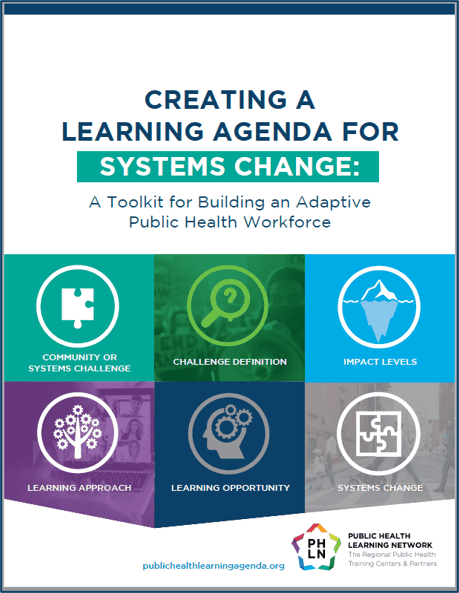Collaborations
We are well-connected to each other, to our national partners, and to the expertise needed to support the public health workforce on a local and national basis.

The Public Health Learning Agenda for Systems Change
Today’s workforce development models (and many trainings) do not address systems change in the community. Rather, they focus on how to improve individual skills and knowledge to do a particular job or task. While this is important, these trainings don’t create a workforce and network of partners who, together, are equipped to address the root challenges of public health today.
Developed by the Public Health Training Center Network (Regions 1, 4, 5, 8 and 10) — in partnership with the University of Illinois at Chicago’s Policy, Practice, and Prevention Research Center — the Learning Agenda is designed to help public health teams use learning to achieve a vision of healthy, thriving communities.
The goal of the Learning Agenda is to help public health organizations, their partners, and communities use transformative learning as a driver for systems change. Read more about the Learning Agenda and its core components:
- The Learning Agenda Manuscript
- The Conceptual Learning Framework, including the six steps of the Learning Agenda
- Results of the pilot test of the Learning Agenda in the Journal for Public Health Management and Practice
- Other tools and worksheets
- Coming soon: a short video about the Learning Agenda

Racial Justice Competencies for Public Health Professionals
The PHTCN, in partnership with NNPHI, has developed a set of Racial Justice Competencies for Public Health Professionals that can be used in developing racial justice education training. This is consistent with agencies across the country declaring racism a public health issue, and expressing interest in ongoing health equity and racial justice training.
Process:
- Create a competency library of more than 650 statements from existing competency models related to race and equity
- Enlist an expert panel of 35 public health professionals to identify, modify, and categorize competencies
- Build draft models
- Validate via surveys, town halls, and pilot testing
- Finalize and disseminate
Components:
The RJCM now contains 51 total statements (17 introductory, 17 intermediate, 17 leading) – across the following domains:
- Assessment
- Policy Development
- Assurance
All are aligned with the Core Competencies for Public Health Professionals and the 10 Essential Public Health Services.

PH WINS
The de Beaumont Foundation and Association of State and Territorial Health Officials have partnered with the Regional Public Health Training Centers to broaden access to the 2024 Public Health Workforce Interests and Needs Survey (PH WINS). PH WINS seeks to understand the interests and needs of the state, local, and territorial government public health workforce in the United States and was fielded in 2014, 2017, 2021, and 2024.
For the first time ever, PH WINS 2024 included all local health departments of all sizes across the nation. This expansion is due to the success of the 2021 PH WINS for All pilot, which was conducted in partnership with the Region V Public Health Training Center and the Northwest Center for Public Health Practice. Prior to 2021, local health departments were selected to participate through a random sample, and small local health departments were excluded.
This multi-region partnership led to participation from 1,178 local health departments in 48 states. All health departments will receive national data with many receiving agency-specific data. Complete results from PH WINS 2024, including redesigned dashboards with dynamic data visualization, will be released in July 2025.
For more information on the 2024 survey, including frequently asked questions, visit the PH WINS 2024 webpage and read about its new directions.
